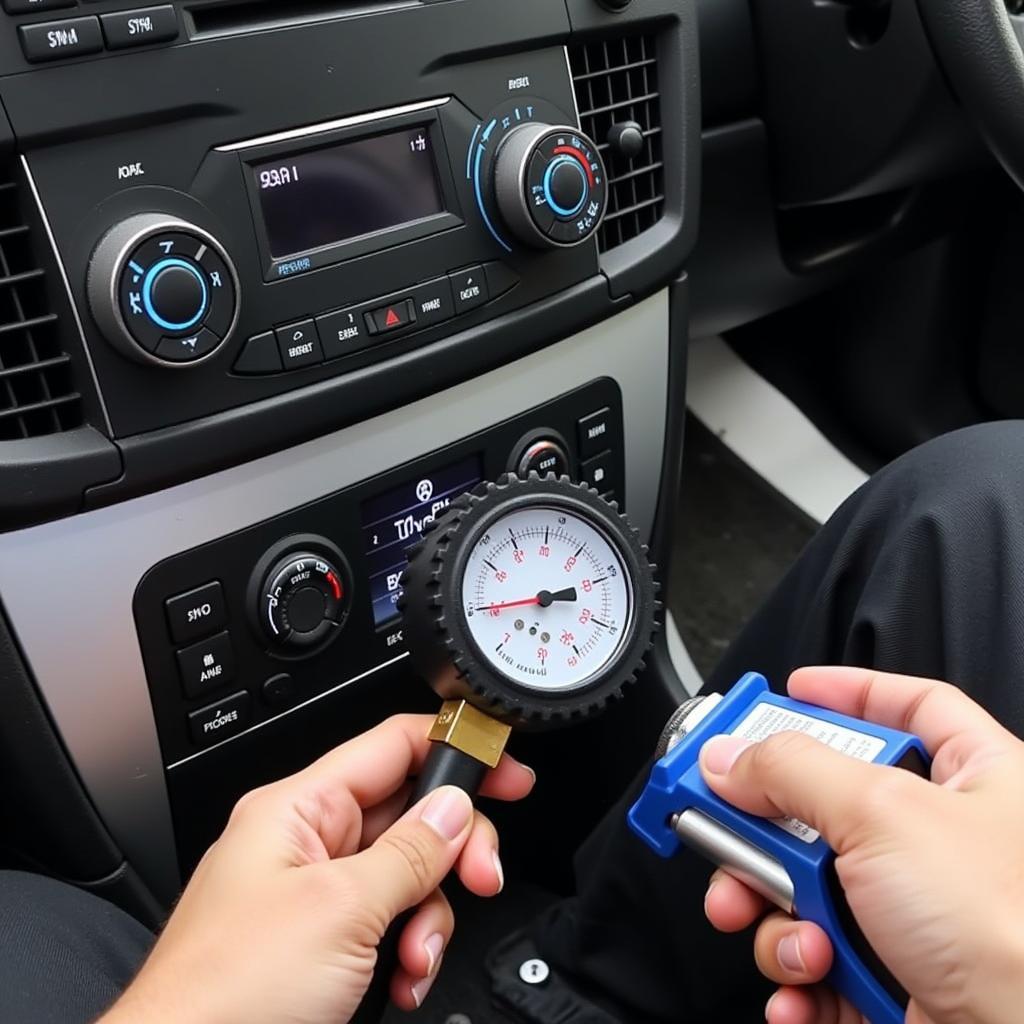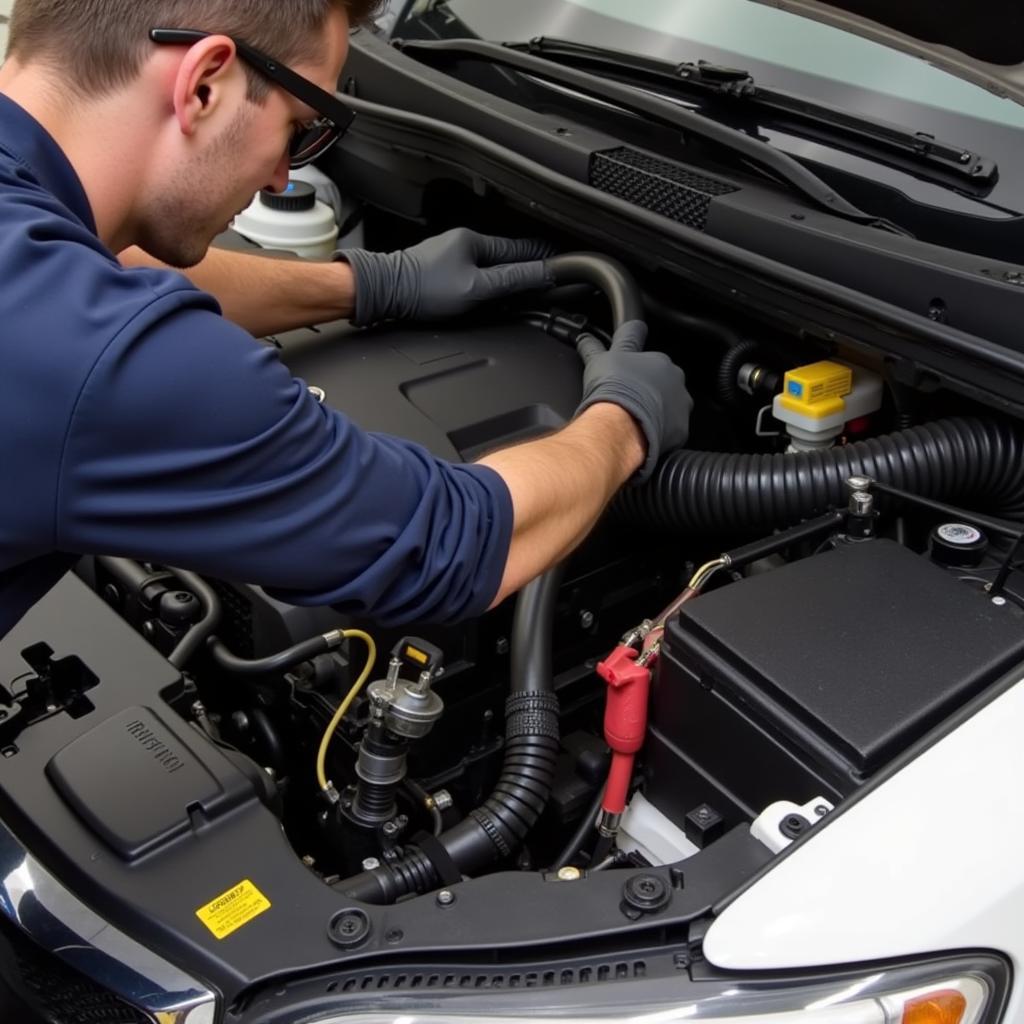Fixing Car Ac Hose Leaks can be a frustrating experience, especially during hot weather. This guide provides a comprehensive approach to diagnosing and repairing these leaks, offering valuable insights for car owners, mechanics, and automotive technicians. From understanding the common causes to exploring DIY solutions and professional repairs, we’ll cover everything you need to know to get your car’s AC back in top shape. Learn how to identify the source of the leak, choose the right repair method, and prevent future AC hose issues.
A leaky AC hose can significantly impact your car’s cooling performance. It’s crucial to address this issue promptly to avoid further damage and discomfort. You can find qualified technicians to fix your car’s AC or learn how to fix air conditioner leak in car yourself. This article will help you understand the complexities of fixing car AC hose leaks and make informed decisions about the repair process.
Understanding Car AC Hose Leaks
Car AC hoses are responsible for circulating refrigerant, the lifeblood of your cooling system. Over time, these hoses can develop leaks due to various factors, including:
- Age and wear: Constant exposure to heat, pressure, and engine vibrations can degrade the hose material, leading to cracks and leaks.
- Corrosion: Exposure to road salt, moisture, and other environmental elements can corrode the hoses, weakening them and causing leaks.
- Improper installation: Incorrectly installed hoses can be prone to leaks due to stress and misalignment.
- Mechanical damage: Impact from road debris or accidental contact with other engine components can puncture or damage the hoses.
Diagnosing the Leak
Identifying the source of an AC hose leak requires careful inspection. Here are some common methods:
- Visual inspection: Look for signs of oil or refrigerant residue around the hoses and connections.
- Pressure test: A professional AC service machine can pressurize the system to pinpoint leaks.
- UV dye: Adding a UV dye to the refrigerant allows leaks to be detected with a blacklight.
- Electronic leak detector: These specialized tools can detect even the smallest refrigerant leaks.
 Performing a Pressure Test on Car AC System
Performing a Pressure Test on Car AC System
DIY Repair Options
For minor leaks and accessible hoses, you may consider a DIY repair. Some options include:
- Sealant: Specialized AC hose sealants can temporarily seal small leaks. However, this is not a permanent solution.
- Hose repair kit: These kits allow you to patch small holes or cracks in the hose.
- Hose replacement: Replacing the leaky hose is the most effective long-term solution for DIY enthusiasts. You can find helpful resources online about who fixes car air conditioners if you are unsure.
However, if you are unsure about your skills, it is always advisable to seek professional assistance.
Professional Repair
For complex leaks or if you are not comfortable working on your car’s AC system, it’s best to consult a qualified technician. They have the expertise and equipment to accurately diagnose and repair any AC hose leak. You can search for “car ac fixing near me” to find local repair shops. Knowing what’s the average cost to fix a car air conditioner can help you budget for the repair.
 Professional Car AC Hose Repair
Professional Car AC Hose Repair
Preventing Future Leaks
Regular maintenance and proactive care can help prevent future AC hose leaks. Consider these tips:
- Regular inspections: Have your car’s AC system inspected annually by a qualified technician.
- Cleanliness: Keep the engine compartment clean to prevent corrosion and debris buildup.
- Proper refrigerant levels: Ensure the refrigerant level is correct to avoid excessive pressure on the hoses.
Conclusion
Fixing car AC hose leaks is crucial for maintaining a comfortable driving experience, especially in hot climates. By understanding the causes, diagnosis methods, and repair options, you can effectively address this issue and prevent future problems. Don’t hesitate to contact AutoTipPro at +1 (641) 206-8880 or visit our office at 500 N St Mary’s St, San Antonio, TX 78205, United States, for expert assistance with your car AC needs.
FAQ
-
How can I tell if my car AC hose is leaking? Look for signs of oil or refrigerant residue, decreased cooling performance, or hissing sounds.
-
Can I fix a car AC hose leak myself? Minor leaks can be addressed with DIY solutions, but complex leaks require professional repair. How to fix clogged ac drain line in car is another common issue you might be able to tackle yourself.
-
How much does it cost to fix a car AC hose leak? The cost varies depending on the severity of the leak, the type of vehicle, and the labor rates in your area.
-
How can I prevent car AC hose leaks? Regular inspections, maintaining cleanliness, and ensuring proper refrigerant levels can help prevent leaks.
-
What are the common causes of car AC hose leaks? Age, wear, corrosion, improper installation, and mechanical damage are common culprits.
-
What tools do I need to fix a car AC hose leak? Depending on the repair, you might need sealants, repair kits, or tools for hose replacement. Professional repairs require specialized equipment.
-
Is it safe to drive with a leaking car AC hose? While you can still drive, a leak can lead to further damage and reduced cooling performance, so it’s best to address it promptly.




Leave a Reply